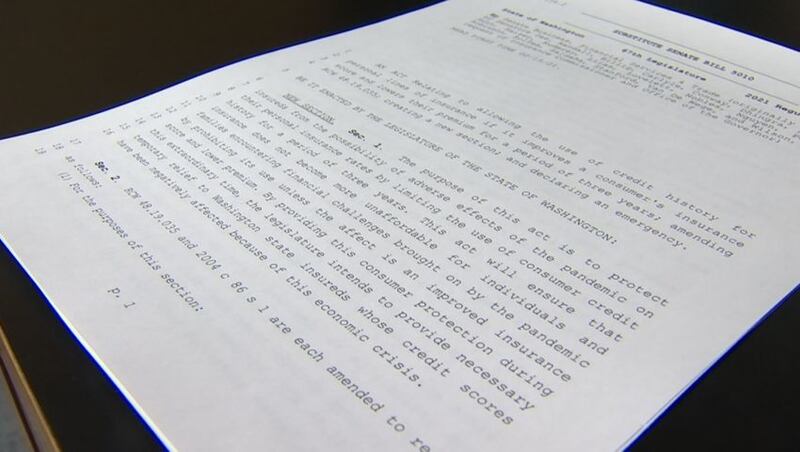Olympia, WA — You better keep your credit as straight as your driving for the next year because Senate Bill 5010 is dead. And that means insurance companies will continue using credit scores to help determine your rates.
State Senator Mona Das from Kent authored the bill and says she’s disappointed but promises to fight for it again next session.
“So we can actually have an insurance industry that’s not got baked in all of these biased institutional racist practices,” says Das.
So what happened?
Senator Mark Mullet from Issaquah asked for amendments.
With the help of an insurance industry attorney, 5010 went from abolishing the use of credit scores, to a three year credit score freeze.
“It was much better than doing nothing. So i’m really surprised, obviously on your show the commissioner came out and said i’d rather take no bill than small progress,” says Mullet.
Senator Mullet is talking about Insurance Commissioner Mike Kreidler who bristled at the changes to the bill.
“Stop listening to the insurance industry and the insurance companies’ big money and start paying attention to the people out there being hurt particularly in a pandemic,” says Kreidler.
Senator Das says the ensuing infighting buried the bill. The amended form made it out of committee and onto the floor, but didn’t get a vote before the deadline.
“We had one group of people who wanted the bill in its original form and one group of folks who wanted it in its amended form and those two sides could never quite collaborate,” explains Das.
We’ve been investigating the use of credit scoring to determine insurance rates. Numbers provided by the Consumer Federation of America show, in many cases, that the zip codes with the highest percentages of blacks also had the highest insurance rates in the state.
“This is where I was raised, this is my home. I want to stay here. I would like to know why I am paying more for my insurance,” said south Seattle business owner Theo Martin, when we showed him the numbers.
The Governor called for a vote on the original bill. So did the NAACP and AARP, which said credit scoring would hurt seniors.
“And in the case of many seniors, they have - no longer have credit. They don’t have revolving credit on credit cards or they pay them off or they rely solely on a debit card which does not impact your credit rating. Or they’ve paid off their mortgage and are no longer holding a mortgage. And a credit score reflects your payment history,” said AARP of Washington advocacy director Cathy MacCaul.
And some insurance agents, like Steve Hall, say the current system just isn’t fair.
“They’re using it as a crystal ball. They’re saying that a person with a bad credit score is more likely to have a future claim than someone that has higher credit score,” says Hall.
He also says it creates an unequal system, confirming that credit score is weighted so heavily that someone with excellent credit and a DUI could have lower car insurance rates than someone with poor credit and a perfect driving record.
“Yes. They will,” says Hall. “I’ve rated it. On my computer.”
Although Senator Mona Das believes insurance companies benefit with no bill passing this year, she says the debate isn’t over.
“Dropping bills like this starts a conversation,” says Das. “And puts everyone on notice and you come back next year and pass the bill.”
Follow the rest of this story:
- Seattle NAACP among dozens of groups now supporting full ban on credit scoring in insurance
- Governor speaks out in support of ban on use of credit scores to set insurance rates
- Insurance industry helped write changes that regulator says ‘gutted’ bill to take credit scoring out of insurance
- Bill to end use of credit scoring in insurance rates may get a vote - with major changes
- Race, credit scoring, and the most expensive neighborhood for car insurance in Washington
- Could you pay less for insurance, under a proposal to ban using credit scores to calculate premiums?

Email Jesse right now at consumer@kiro7.com
Cox Media Group








